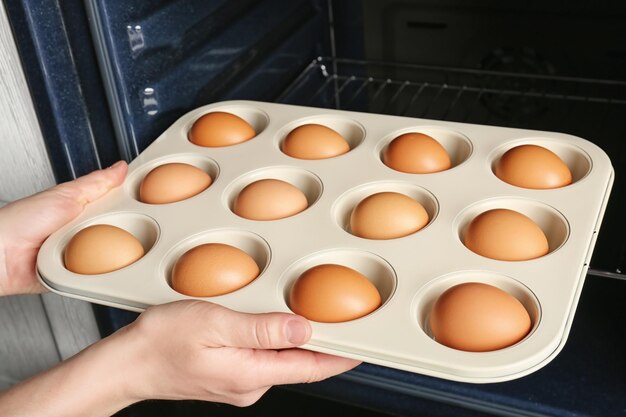How Long Are Cooked Eggs Safe in Your Fridge? Your Ultimate Guide to Egg Storage
Eggs are a staple in many households, cherished for their versatility, nutritional value, and taste. From breakfast scrambles to complex recipes, cooked eggs play a vital role in our meals. However, a key question arises once these delectable dishes are placed in the refrigerator: How long can they safely last? In this guide, we'll explore everything you need to know about storing cooked eggs, ensuring both safety and taste.
🥚 The Basics of Cooked Egg Storage
Understanding the fundamentals of cooked egg storage is crucial. Eggs, like other perishable items, require specific handling to ensure they remain safe to consume and maintain their quality.
Storage Time Guidelines
The general consensus for storing cooked eggs in your refrigerator is to consume them within three to four days. This time frame helps minimize the risk of foodborne illness and preserves the eggs' texture and flavor.
Why Storage Duration Matters
Leaving cooked eggs in your fridge for too long can lead to spoilage and the growth of bacteria such as Salmonella. Refrigeration slows but doesn't stop the growth of harmful pathogens, making it vital to adhere to storage guidelines.
🧊 Tips for Properly Storing Cooked Eggs
To maximize the shelf life and safety of your cooked eggs, follow these key storage tips:
Cool Quickly: After cooking, allow eggs to cool at room temperature for no more than two hours before refrigerating.
Use Airtight Containers: Store eggs in airtight containers to maintain freshness and prevent exposure to other odors.
Label and Date: Keep track of when you cooked the eggs by labeling containers with the date.
Temperature Check: Ensure your refrigerator is set to 40°F (4°C) or below to inhibit bacterial growth.
Avoid Door Storage: Place cooked eggs on a shelf instead of the door, where temperatures can fluctuate with frequent opening.
🤔 Understanding Signs of Spoilage
Even with proper storage, it’s important to recognize when cooked eggs have gone bad. Here are a few indicators:
- Foul Odor: A sour or sulfur-like smell is a strong indicator of spoilage.
- Unusual Texture: Watch for watery or slimy textures, which suggest bacterial growth.
- Discoloration: Any unexpected color changes indicate that it's time to discard the eggs.
🍳 Different Types of Cooked Eggs
Cooked eggs come in various forms, each with their unique storage considerations. Let’s explore some common types and how their storage might differ:
Boiled Eggs
Hard-boiled eggs are often stored whole in their shells, making them less prone to drying out. They should still be consumed within a week for the best quality.
Scrambled Eggs
Scrambled eggs can become rubbery after refrigeration, so they are best consumed within the three to four-day window and reheated gently to maintain texture.
Egg-Based Dishes
For dishes like quiches or frittatas, the three to four-day guideline applies. These dishes can become soggy and unappetizing if stored too long.
♻️ Reheating Cooked Eggs
Reheating is another critical step that affects the quality and safety of your eggs. Follow these quick tips for optimal results:
- Microwave: Use short bursts and stir frequently for even heating without drying out.
- Stovetop: A skillet with a little butter or oil works well to gently reheat without overcooking.
Safety Tips for Reheating
- Avoid Multiple Reheats: Reheating more than once increases the risk of bacterial growth.
- Hot Throughout: Ensure eggs are reheated until they reach a temperature of 165°F (74°C).
📝 Key Takeaways for Egg Storage
Here’s a quick reference list to keep in mind:
- 📅 Store Within 2 Hours: Get eggs into the fridge shortly after cooking.
- 📆 3-4 Day Limit: This is the maximum storage period for safety and quality.
- 🧴 Airtight is Right: Containers keep eggs fresh and free from fridge odors.
- ❌ Watch for Spoils: Look for key spoilage signs before consuming.
- 🔄 Single Reheat: Limit reheating to once for safety.
🥄 Expanding on Related Questions
While we've focused on the primary question of storing cooked eggs, there are additional points often related to this topic. Let's delve into some of these areas:
Raw vs. Cooked Eggs: Storage Comparison
Raw eggs in their shells last three to five weeks in the refrigerator due to the protective nature of the shell and natural coatings. Once cooked, however, they become susceptible to spoilage much quicker.
Are Freezing Cooked Eggs an Option?
Yes, freezing is an excellent way to extend the life of cooked eggs, but it works better with some types than others.
- Scrambled eggs freeze well and can be thawed for an easy meal.
- Hard-boiled eggs don't freeze as successfully, changing texture upon thawing.
The Impact of Ingredients
The ingredients used in egg dishes can affect their shelf life. For example, dishes with heavy cream may not keep as long as simpler recipes.
🤩 Enjoying Eggs Safely and Deliciously
Eggs, when properly stored and handled, remain a nutritious and versatile ingredient in cooking. By adhering to these guidelines, you're ensuring your meals are both enjoyable and safe. Next time you're finished a delightful egg dish, you'll know exactly what steps to take to preserve your culinary efforts — making the most of your groceries while keeping your family safe.
Egg storage doesn't have to be a puzzle. With these guidelines, you can navigate your refrigerator confidently, always ensuring that your cooked eggs are as fresh and safe as their creators intended. Enjoy your meals with peace of mind, knowing you're equipped with the best practices in cooked egg storage!

